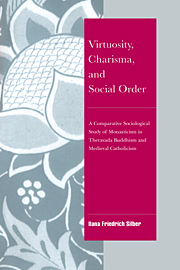 Virtuosity, Charisma and Social Order
Virtuosity, Charisma and Social Order Book contents
- Frontmatter
- Contents
- Preface
- Introduction
- Part I Virtuosi and society: elements of a comparative macrosociological approach
- Part II Virtuosi and society in Theravada Buddhism
- Part III Virtuosi and society in medieval Catholicism
- Part IV Virtuosity, charisma, and social order
- Conclusion: Religious virtuosity as ideological power: some implications for the comparative study of civilizations
- Bibliography
- Index
- Frontmatter
- Contents
- Preface
- Introduction
- Part I Virtuosi and society: elements of a comparative macrosociological approach
- Part II Virtuosi and society in Theravada Buddhism
- Part III Virtuosi and society in medieval Catholicism
- Part IV Virtuosity, charisma, and social order
- Conclusion: Religious virtuosity as ideological power: some implications for the comparative study of civilizations
- Bibliography
- Index
Summary
One of the true rewards in bringing this book to its completion is the opportunity to properly acknowledge intellectual debts incurred along the way. My greatest debt is to Shmuel N. Eisenstadt, who first introduced me to the ambitious horizons of comparative historical sociology in general and to the importance of religious traditions in the dynamics of civilizations in particular. His influence on my work goes much beyond the explicit references to his writings in either the body of the text or the footnotes – although I am well aware that he would have handled the topic in a very different manner. I have also had the privilege of benefiting from the encyclopedic knowledge and prodding guidance of R. J. Zwi Werblowsky, one of the very few true comparativists in the study of religion. Stanley J. Tambiah's rich amalgam of anthropological, historical, and macrosociological traditions of analysis first triggered my interest in Theravada Buddhism. His encouragement at an early stage bolstered my confidence to undertake the dauting task of juggling many different worlds of scholarship. I wish to put on record my deep gratitude to Steven Collins, who commented on two earlier versions of the manuscript and, above all, lent me precious intellectual support at times when the cost of crossing the boundaries of disciplines and fields of expertise seemed to become overwhelming. I also thank Michael Carrithers, as well as an anonymous reader, whose critical comments spurred me on to produce what I hope is a better book.
- Type
- Chapter
- Information
- Virtuosity, Charisma and Social OrderA Comparative Sociological Study of Monasticism in Theravada Buddhism and Medieval Catholicism, pp. ix - xPublisher: Cambridge University PressPrint publication year: 1995
- 1
- Cited by
